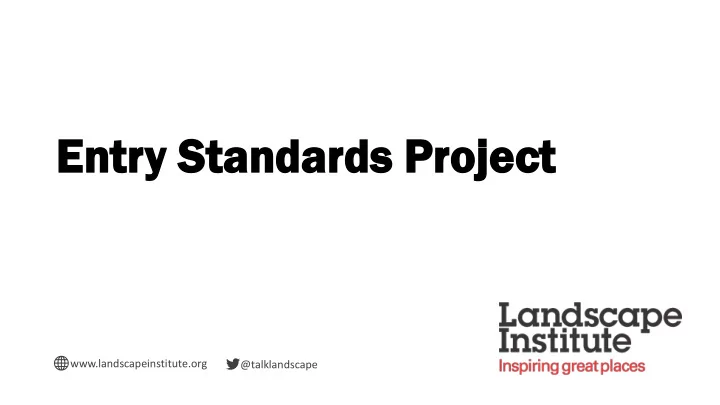

En Entr try y Stan andards dards Pr Proj oject ect www.landscapeinstitute.org @talklandscape 1
Staying relevant to landscape practice today Those people learning: • Apprentices • Students • Recent graduates In all areas of landscape (and place) practice • Senior professionals • Experienced professionals • Technicians • Career changers • Public sector, private & third sectors • More self employed
Entry standards, talent & relevance BROAD EDUCATION DIVERSITY AND APPRENTICESHIPS FUTURE PROOF PROFESSION SPREAD INCLUSION Creating new routes Ensure the Focus to ensure Support to ensure Support and develop into the profession to Landscape Institute is education routes are diversity and the profession to increase numbers the professional more evenly spread inclusion strategy is enable it is future entering profession home to a broad across the UK. adopted by the proofed and support diversity range of landscape International links profession agenda professionals will also be explored in the future
What we want to achieve • Membership Entry Standards that are fit for purpose in the 21st Century. • Entry processes that are relevant, flexible and can be easily administered. • Preserve the identity of ‘Chartered Landscape Architect’ and set up new standards for ‘Chartered Landscape Professionals’ and others. • Be transparent, objective, use market insight about existing roles and employer expectations • WELCOMING AND INCLUSIVE to all landscape disciplines 5
Defining the future of the profession Education Review State of Landscape survey Landscape Management Leadership forum Routes to Licentiate working group Entry standards modernisation 6
Entry Standards activities • Changes to membership grades – new Technician grade, changing Licentiate to Associate • Working with Trailblazer Employer Group to develop Apprenticeships that lead to membership – Level 3 and Level 7 • Developing a Competency Framework to embrace the broadening the profession • Reviewing entry standards • Reviewing/developing assessment methods for all membership grades • Reviewing University accreditation 7
How will we use the Competency Framework ? DEMONS NSTRA RATE TE LINK K TO OTHER ER MEMBER ERSHIP HIP PROFESS ESSION ONAL AL SUPPOR ORT T BREADTH ADTH OF ENTRY DEVEL ELOP OPMEN ENT T RECRUITMENT ITMENT PROFESS ESSION ONS SERVICES ES Will help our Will help members Will help employers Will enable mutual Will be used as a members show the identify CPD needs show skills needed recognition of like benchmark for wide range of skills each year for landscape roles skills and easy membership they possess in the future identification of assessment shared interests
Structure of the competency framework • Landscape Professional competencies – common to and required at some level across all landscape specialisms • Professional Competencies - common across most professional sectors and required at some level for all landscape specialisms • Specialist competencies - representing the different landscape specialisms – some competencies may be mandatory for specific specialisms and others can be chosen by individuals to reflect their specific knowledge and skills 9
Progressive levels of competency LEVEL TITLE DEFINITION Has knowledge and an understanding of the application of this in 1 Understanding practice Has experience of applying knowledge and understanding in 2 Able practice. Consistently applies knowledge and understanding in practice 3 Accomplished and confidently makes decisions, provides professional advice and makes recommendations Has expert knowledge, extensive experience and is widely 4 Expert recognised as an authority by others within and outside the organisation 10
Consultation • During March • 163 responses • Diverse range of specialisms and employer types represented • Member support for the Framework • Urgent need to define the levels for each competency • Support for the general structure of the framework and the three types of competency • Support for four levels of competency • The feedback did not indicate a need to make substantial changes to the landscape or professional competencies • There is a need to check for overlap across the framework • Additional focus needed on creativity, visual communication and community engagement
Professional Competencies Landscape Professional Competencies • Communication, negotiation and • Community engagement influencing • Creative problem solving • Data management • Healthy places • Digital practice • Inclusive environments • Economic systems and context • Landscapes as systems • Equality and diversity • Landscape quality • Health and safety • Landscape specialisms and industry • Management organisations and services structure • People management and leadership • Physical and social context of sites/places/landscapes • Governance of societies (legal and political) • Planning, legal and regulatory framework • Professional judgement, ethics and values • Research and analysis • Project management • Sustainability and resilience • Team working and collaboration 12
Specialist Competencies (to be chosen relevant to landscape specialism) – shown here in alphabetical order Arboriculture and woodland Landscape planning and/or policy Contract administration Landscapes/places and people (including tourism) Design – Garden Management of landscapes Master planning Design – Landscape Natural capital and ecosystem services Design - Play and/or recreation Place management Design - Public realm Planting Digital technology and photography Protected landscapes/places Education and knowledge exchange Soil management, conservation and Grants and funding improvement Habitats and species Visualisation Heritage landscapes/places Water management Landscape assessment Landscape construction (materials and systems) Landscape ecology Landscape engineering 13
QUES QU ESTIONS TIONS 14
Groups 1 and 2 Please consider each of the Landscape competencies and identify which level of competence you feel would be relevant for qualification as a Chartered Member of the Landscape Institute in your specialism. Groups 3 and 4 Please consider each of the Professional competencies and identify which level of competence you feel would be relevant for qualification as a Chartered Member of the Landscape Institute in your specialism. Groups 5 and 6 Please identify which of the Specialist competencies you would select for qualification as a Chartered Member of the Landscape Institute for your specialism 15
FE FEEDBA EDBACK CK AN AND QU QUES ESTION TIONS S 16
Recommend
More recommend